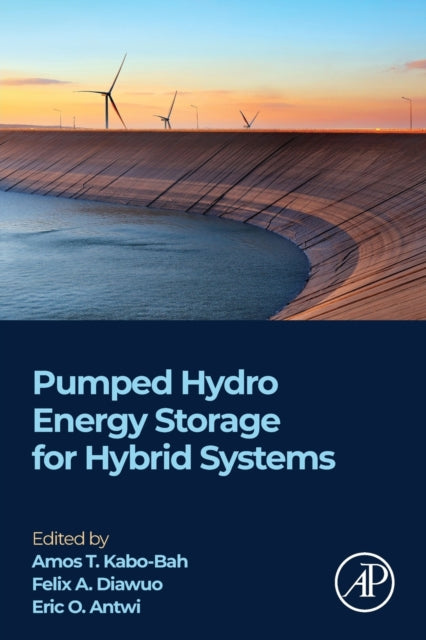Shulph Ink
Pumped Hydro Energy Storage for Hybrid Systems
Pumped Hydro Energy Storage for Hybrid Systems
YOU SAVE £12.68
- Condition: Brand new
- UK Delivery times: Usually arrives within 2 - 3 working days
- UK Shipping: Fee starts at £2.39. Subject to product weight & dimension
Bulk ordering. Want 15 or more copies? Get a personalised quote and bigger discounts. Learn more about bulk orders.
Couldn't load pickup availability
- More about Pumped Hydro Energy Storage for Hybrid Systems
Pumped Hydro Energy Storage for Hybrid Systems is a comprehensive book that discusses the characteristics, planning, and implementation aspects of PHES, along with its techno-economic issues. It explores the importance of pumped hydro energy storage in load balancing, peak load shaving, grid stability, and hybrid energy systems deployment. The book provides an analysis of the architecture and process description of different types of PHES, along with case studies and advantages and disadvantages of various applications.
Format: Paperback / softback
Length: 182 pages
Publication date: 15 September 2022
Publisher: Elsevier Science Publishing Co Inc
Pumped Hydro Energy Storage for Hybrid Systems is a comprehensive guide that delves into the practical aspects, planning, and implementation of pumped hydro energy storage (PHES) in hybrid systems. It emphasizes the significance of PHES and its role in various aspects such as load balancing, peak load shaving, grid stability, and the deployment of hybrid energy systems. The book provides an in-depth analysis of the architecture and process description of different types of PHES, both established and emerging. It also discusses various case studies of pumped hydro energy storage, highlighting their advantages and disadvantages in different applications.
For students, researchers, and engineers interested in renewable energy, hydropower, and hybrid energy systems, this book serves as an essential resource. It offers a comprehensive understanding of PHES technology, enabling professionals to contribute to the development and advancement of sustainable energy solutions.
The book is organized into several chapters, each covering a specific aspect of PHES. The first chapter provides an introduction to the concept of PHES and its historical development. It discusses the basic principles of hydroelectric power generation and the challenges associated with storing and releasing energy.
The second chapter focuses on the planning and implementation of PHES. It discusses the criteria for selecting suitable sites for pumped hydro storage facilities, the design and construction of storage reservoirs, and the control systems required for efficient operation. The chapter also explores the techno-economic issues associated with PHES, such as cost estimation, investment returns, and regulatory considerations.
The third chapter examines the characteristic features of PHES. It discusses the advantages and disadvantages of different storage technologies, such as gravity dams, pressure vessels, and underground caverns. The chapter also explores the factors that influence the performance of PHES, such as water quality, operating conditions, and environmental impact.
The fourth chapter discusses the role of PHES in hybrid energy systems. It discusses the integration of PHES with renewable energy sources, such as solar and wind power, to improve the reliability and efficiency of power generation. The chapter also explores the potential applications of PHES in smart grids, where it can be used to balance supply and demand, optimize energy usage, and improve grid stability.
The fifth chapter focuses on the case studies of pumped hydro energy storage. It discusses the successful implementation of PHES projects in different parts of the world, including China, Norway, and the United States. The chapter highlights the economic, environmental, and social benefits of these projects and discusses the challenges and lessons learned from their implementation.
The sixth chapter examines the advantages and disadvantages of different applications of PHES. It discusses the potential applications of PHES in power generation, transmission, and distribution, as well as in water management and renewable energy integration. The chapter also explores the challenges and limitations of PHES in certain applications, such as high upfront costs, limited storage capacity, and environmental impact.
In conclusion, Pumped Hydro Energy Storage for Hybrid Systems is a valuable resource for students, researchers, and engineers interested in renewable energy, hydropower, and hybrid energy systems. It provides a comprehensive and up-to-date understanding of PHES technology, enabling professionals to contribute to the development and advancement of sustainable energy solutions. The book's practical approach, comprehensive analysis, and case studies make it an essential read for anyone seeking to gain insights into this rapidly growing field.
Weight: 310g
Dimension: 151 x 230 x 17 (mm)
ISBN-13: 9780128188538
This item can be found in:
UK and International shipping information
UK and International shipping information
UK Delivery and returns information:
- Delivery within 2 - 3 days when ordering in the UK.
- Shipping fee for UK customers from £2.39. Fully tracked shipping service available.
- Returns policy: Return within 30 days of receipt for full refund.
International deliveries:
Shulph Ink now ships to Australia, Belgium, Canada, France, Germany, Ireland, Italy, India, Luxembourg Saudi Arabia, Singapore, Spain, Netherlands, New Zealand, United Arab Emirates, United States of America.
- Delivery times: within 5 - 10 days for international orders.
- Shipping fee: charges vary for overseas orders. Only tracked services are available for most international orders. Some countries have untracked shipping options.
- Customs charges: If ordering to addresses outside the United Kingdom, you may or may not incur additional customs and duties fees during local delivery.


